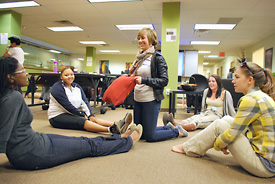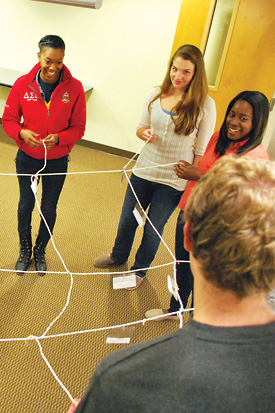The simple act of talking can tear down barriers between races, social classes, cultures and religions.
This is the lesson developed by the Program on Intergroup Relations (IGR) and its signature offering, Intergroup Dialogue — a model program developed at U-M that promotes talk among diverse groups to promote understanding. The program continues to thrive as IGR celebrates its 25th anniversary this year.
IGR, founded in 1988, was the first such program in higher education. Its goal is to develop students’ knowledge and skills for living and working in multicultural societies.
“IGR has shaped my Michigan experience by providing a community for me of people who are so passionate about social justice and dialogue,” says Melanie Hebeisen, a senior from Northbrook, Ill., majoring in sociology and women’s studies. She says the program has led her to join organizations and programs more social justice and diversity oriented.
“IGR courses, compared to others on campus, provided me the opportunity to critically reflect on my own social identities and co-learn with my peers on how social identities impact our everyday lives and our society,” says Laura Parkinson, a senior from Berrien Springs. The organizational studies and sociology major works at IGR CommonGround to train facilitators and manage social justice workshops.
Kelly Maxwell and Monita Thompson, IGR co-directors, say a key focus of the IGR anniversary year is the seventh National Intergroup Dialogue Institute June 19-22 at the Sheraton Ann Arbor.
“The purpose of the institute is to share and disseminate our four-stage model of intergroup dialogue to faculty and staff who wish to learn our philosophy and techniques for the purpose of creating dialogue programs on their own campuses,” Thompson says.


Facilitators in the IGR CommonGround program engage in a name-learning icebreaker exercise. From left are: Somalia Jones, Asia Bond, Melanie Hebeisen, Megan Blovin and Stephany Trujillo. Photo by Laura Parkinson.
From left: Adrienne Clabin, Jessica Harper, Cachet Colvard and Nathan Mueting participate in an IGR exercise called the “web of oppression.” Photo by Laura Parkinson.
Since the institute was founded in 2006, IGR has hosted 110 other institutions from across the U.S. and Canada for such training.
Intergroup Dialogue brings together students from two or more social identity groups to engage across cultural or social divides. Throughout the semester, students explore differences and commonalities; examine the nature and impact of power, privilege and discrimination related to social and cultural identity; and seek ways to work across differences to build inclusive and equitable societies.
Maxwell says a key feature of the Intergroup Dialogue process is that after initial sessions led by faculty, classes are led by two undergraduates who have taken semester-long training classes to prepare.
“Students appreciate the peer leadership and it allows them to ask questions they might not ask faculty,” Maxwell says. Thompson says students understand their own experiences differently from faculty or staff, who may be a generation removed from their experience.
Besides promoting understanding, Maxwell says intercultural communication skills also are crucial in a range of job fields going forward, for everyone from scientists to those working in the public sector, universities and more.
Colleen Moran, a senior from Beverly Hills, Mich., majoring in women’s studies, says that by working as a facilitator she learned how to actively listen, and to contain her emotions to be respectful — even when she disagrees with what’s said.
“I learned how to challenge the idea and not the person. I gained insight into other people’s worlds and perspectives, and realized we all experience the world differently and that we need to listen to each other if we want social justice to be achieved,” she says.
Each semester, 1,400 students participate in IGR-related activities. For those unable to take a semester-long Intergroup Dialogue session, IGR provides one-time CommonGround workshops. IGR also promotes research projects, Summer Youth Dialogue sessions, and hosts the National Intergroup Dialogue Institute.
Dan Morse, an Ann Arbor business major and senior who became a student facilitator, says, “These conversations, as well as listening to others’ experiences, put faces and emotions to the issues of inequality and thus made my fight for social justice more relatable and personal.”
IGR is a joint program between LSA and the Division of Student Affairs.

